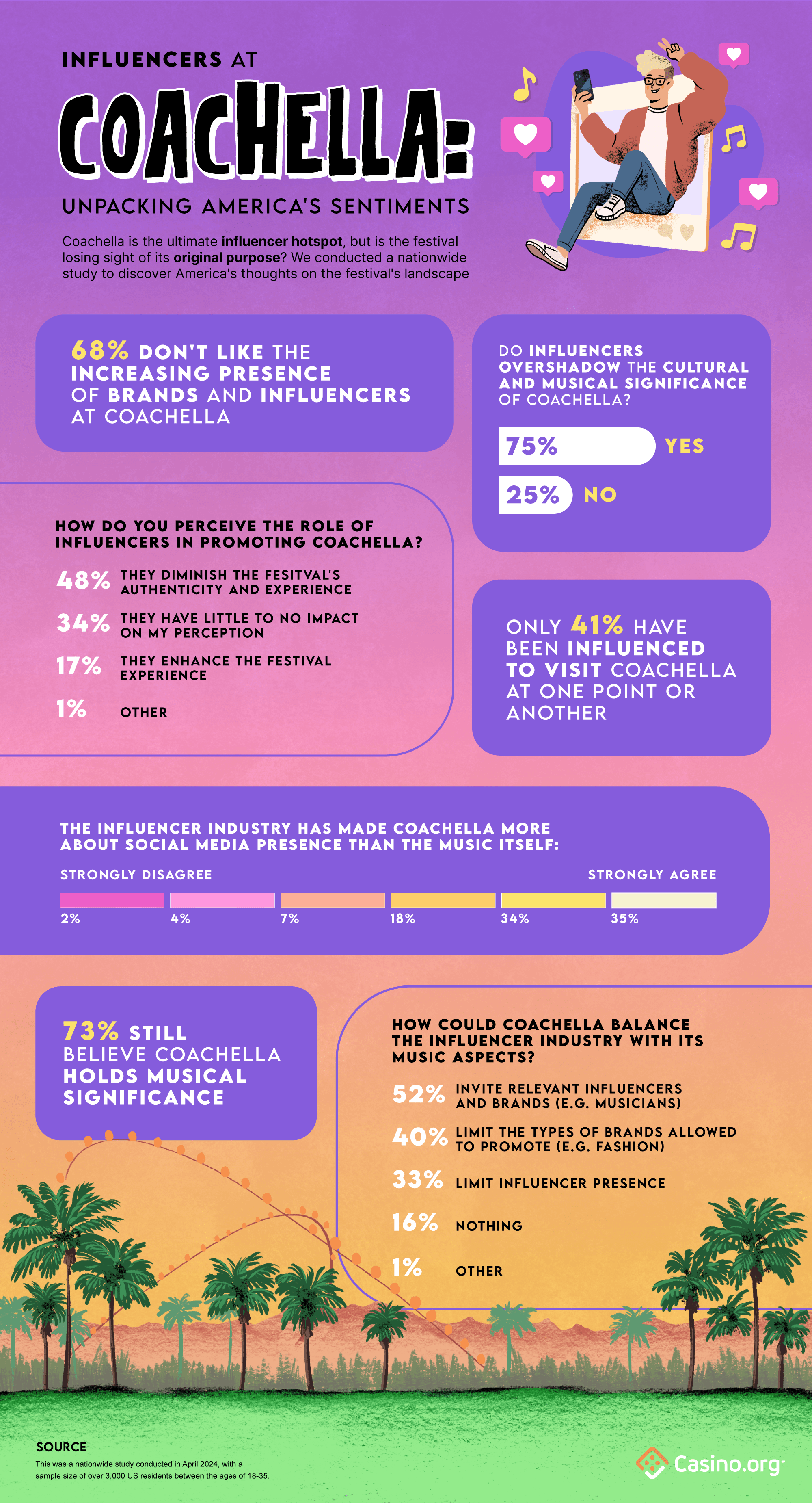America’s Perspective on Influencers Transforming Coachella
Coachella, long celebrated for its star-studded musical performances and fashion-forward crowds, has evolved far beyond its original roots as a music and arts festival. With high-profile headliners such as Lana Del Rey and Billie Eilish, and iconic festival looks popularized by celebrities like Vanessa Hudgens, it’s no wonder the event garners massive global attention. Yet in recent years, the focus seems to be shifting as a growing influx of social media personalities and branded partnerships steal the spotlight. Is Coachella still about the music, or has it become more of an influencer showcase? To answer this question, a nationwide survey was conducted, revealing how Americans truly feel about the current state of this iconic festival.
Survey Highlights: Public Sentiments on the "Influencer Takeover"
The national survey unearthed strong opinions regarding influencers’ ever-growing presence at Coachella. Here are the pivotal insights:
- Three-quarters of Americans (75%) feel that influencers now dominate Coachella’s purpose, overshadowing its original music and arts focus.
- 68% express their dislike for the growing involvement of both brands and influencers at the festival.
- Nearly half (48%) believe that influencers dilute the authenticity and overall experience of Coachella.
- More than half (52%) think that only relevant influencers and brands should be allowed to participate in the event.
Understanding the Backlash: Brand and Influencer Impact at Coachella
Coachella has become a prime environment for strategic brand placements, most notably through influencer partnerships. Fashion brands such as Revolve, for example, attribute up to 70% of their sales to influencer-driven marketing, and send hundreds of representatives to the festival each year. As influencers and brands become increasingly visible, many attendees and observers are questioning the festival’s direction.
Key findings from the survey reflect this changing atmosphere:
- A significant 75% agree that influencers detract from the cultural and musical heritage of Coachella. While some participants acknowledged the commercial nature of the event, 68% actively voiced frustration with the heightened presence of promotional personalities and brands.
- When asked about influencers’ specific role in promoting Coachella, 48% declared that they negatively affect the event’s authenticity and enjoyment. Meanwhile, 34% felt influencers have little impact on their experience and a minority (17%) thought influencers actually enhance the festival’s vibe.
- Respondents were also asked to rate the statement, "The influencer industry has made Coachella more about social media than music," on a 0 to 5 scale. The average response was a notably high 3.8, and a combined 86% agreed at least somewhat with the statement. Only 14% disagreed with this sentiment, underscoring the widespread perception that social media interests are now paramount.
Public Recommendations for Balancing Influencer Presence with Music
Given these strong opinions, what do Americans suggest as the way forward for Coachella? Participants in the survey proposed several strategies for restoring the festival’s focus on music and arts while still acknowledging the realities of modern branding.
The top recommendations included:
- Invite Only Relevant Influencers and Brands (52%): The most common suggestion was to limit invitations to influencers connected to music and arts, or to brands directly related to the festival’s theme-such as music technology or record labels.
- Restrict Non-Relevant Brands (40%): Many advocated for a cap on the types of non-music-related brands-like those in beauty or banking-allowed to promote at Coachella, in order to maintain relevance for attendees.
- Limit the Number of Influencers (33%): Some felt that simply capping influencer attendance would help restore the festival’s balance and vibrancy.
Only 16% of respondents said that no action is needed regarding influencer and brand participation, and a small 1% offered alternative suggestions, such as requiring influencers to focus on music content in their posts, refining guest lists for exclusivity, or even encouraging less phone use to promote authentic engagement.
Coachella’s Enduring Musical Appeal
Despite widespread concerns about commercialism and social media dominance, most respondents continue to see Coachella as a significant musical gathering. An encouraging 73% believe that the festival remains fundamentally tied to its musical core, even as it navigates increasing influencer and brand engagement. Furthermore, 41% admit they’ve been motivated to attend Coachella themselves-at least in part-because of influencer promotion or brand activations. This suggests that, while opinions are mixed, the transformative power of Coachella’s music and community remains strong amidst evolving trends.
How the Survey Was Conducted
This report is based on a nationally representative survey conducted in April 2024, with 3,000 United States residents aged 18 to 35. The chosen age range reflects Coachella’s average attendee age (25 years old). The survey sample was diverse, with an average respondent age of 28.3, and included 56.8% female, 40% male, 2.4% non-binary, 0.7% transgender, and 0.1% identifying as other.
Content Usage and Attribution
You may use the data and visuals from this article for non-commercial purposes, provided you cite and link back to this page as the original source. For any media or press inquiries, please refer to the contact details provided on our site.














